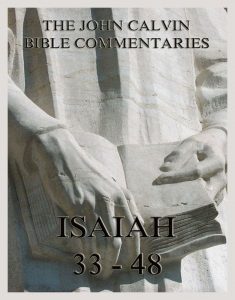John Calvin’s Bible Commentaries On Isaiah 33 – 48 – John Calvin
Calvin produced commentaries on most of the books of the Bible. His commentaries cover the larger part of the Old Testament, and all of the new excepting Second and Third John and the Apocalypse. His commentaries and lectures stand in the front rank of Biblical interpretation. All who take delight in the Holy Scriptures are familiarly acquainted with the writings of The Prophet Isaiah. Every variety of taste finds in them its appropriate gratification. Lofty conceptions, illustrated by splendid imagery, and clothed in language usually copious and flowing, some times abrupt, but always graceful, leave no room for hesitation to pronounce him, with Bishop Lowth, to be “the most sublime and elegant of the Prophets of the Old Testament.” He is regarded with peculiar veneration as an honest, fearless, and able messenger of the Most High God, boldly reproving nobles and monarchs, denouncing the judgments of Heaven against all transgressors, and asserting the claims of the Divine law and government above all human authority. In his Prophecies he takes a wide range, surveys those nations which power or wealth or learning or commerce had raised to the highest celebrity in those remote times, and describes their rise and fall, and wonderful revolutions, so eagerly traced lay us in the page of history, as the execution of Jehovah’s counsels, and the arrangements of unerring wisdom But chiefly does he pour out rich instruction concerning the Messiah, whose life and sufferings, and death and glorious reign, he delineates so faithfully, and with such thrilling interest, that he has obtained the appellation of “The Evangelical Prophet.

John Calvin’s Bible Commentaries On Isaiah 33 – 48
John Calvin’s Bible Commentaries On Isaiah 33 – 48.
ISBN: 9783849675615.
Available at amazon.com and other venues.
Biography of John Calvin (from wikipedia.com)
John Calvin (10 July 1509 – 27 May 1564) was an influential French theologian, pastor and reformer during the Protestant Reformation. He was a principal figure in the development of the system of Christian theology later called Calvinism, aspects of which include the doctrines of predestination and of the absolute sovereignty of God in salvation of the human soul from death and eternal damnation, in which doctrines Calvin was influenced by and elaborated upon the Augustinian and other early Christian traditions. Various Congregational, Reformed, and Presbyterian churches, which look to Calvin as the chief expositor of their beliefs, have spread throughout the world.
Calvin was a tireless polemic and apologetic writer who generated much controversy. He also exchanged cordial and supportive letters with many reformers, including Philipp Melanchthon and Heinrich Bullinger. In addition to his seminal Institutes of the Christian Religion, Calvin wrote commentaries on most books of the Bible, confessional documents, and various other theological treatises.
Originally trained as a humanist lawyer, he broke from the Roman Catholic Church around 1530. After religious tensions erupted in widespread deadly violence against Protestant Christians in France, Calvin fled to Basel, Switzerland, where in 1536 he published the first edition of the Institutes. In that same year, Calvin was recruited by Frenchman William Farel to help reform the church in Geneva, where he regularly preached sermons throughout the week; but the governing council of the city resisted the implementation of their ideas, and both men were expelled. At the invitation of Martin Bucer, Calvin proceeded to Strasbourg, where he became the minister of a church of French refugees. He continued to support the reform movement in Geneva, and in 1541 he was invited back to lead the church of the city.
Following his return, Calvin introduced new forms of church government and liturgy, despite opposition from several powerful families in the city who tried to curb his authority. During this period, Michael Servetus, a Spaniard regarded by both Roman Catholics and Protestants as having a heretical view of the Trinity, arrived in Geneva. He was denounced by Calvin and burned at the stake for heresy by the city council. Following an influx of supportive refugees and new elections to the city council, Calvin’s opponents were forced out. Calvin spent his final years promoting the Reformation both in Geneva and throughout Europe.
(The text of the last section was taken from a Wikipedia entry and is available under the the Creative Commons Attribution-ShareAlike License.)
Publisher’s Note: This book is printed and distributed by Createspace a DBA of On-Demand Publishing LLC and is typically not available anywhere else than in stores owned and operated by Amazon or Createspace.
